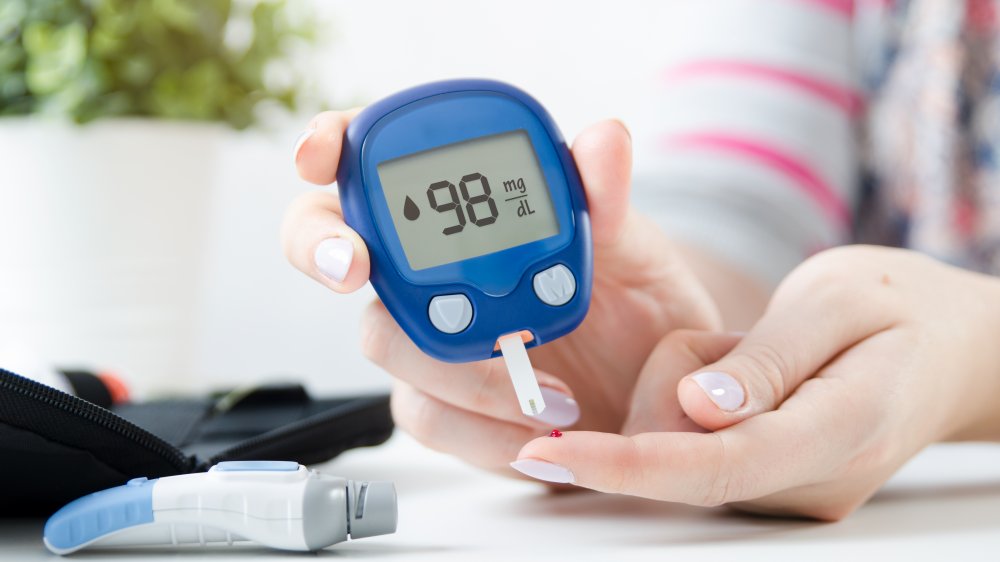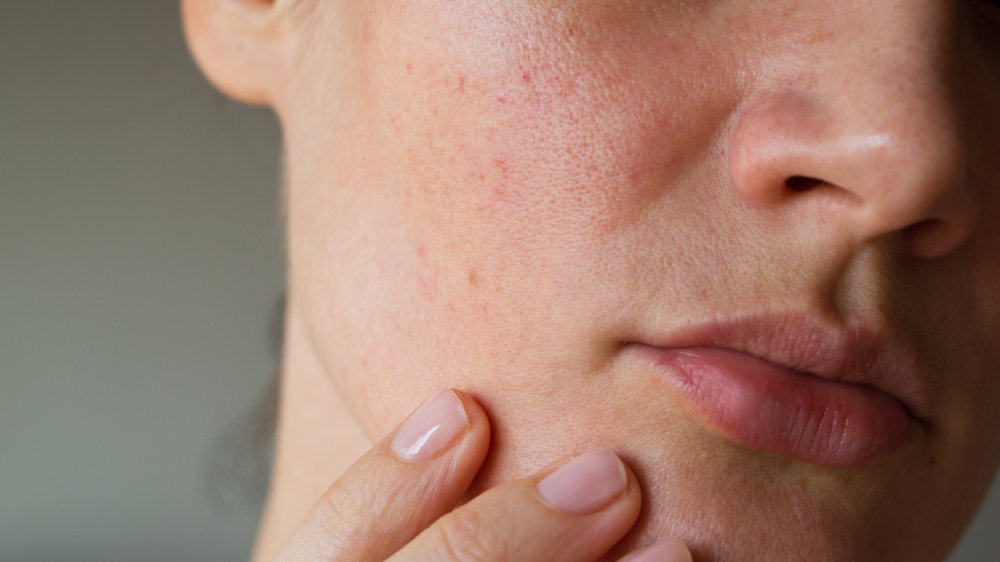Serious Ways Stress Can Do Damage To Your Body
Believe it or not, stress (in moderation) can do the body good. In a potentially dangerous or pressure-filled situation, it is stress and the host of hormones that accompany it that help you power through. Of course, excessive stress is far from beneficial. Over a prolonged period, stress can take a major toll on your mind and body, according to Healthline.
Yes, chronic stress can lead to all sorts of mental and physical health ailments, from depression to hypertension to high blood sugar to infertility. This is why it is so important to manage your stress level, find productive coping mechanisms, and face life's many pressures with flexibility. And if that doesn't work? Seek professional help — because stress is a normal part of life, but it shouldn't dominate your days and impact your health and well-being. Want to know what stress is really doing to you on the inside and out? Here are some ways it is seriously damaging your body — plus a few tips to help stop it in its tracks.
If you are stressed out, you may have trouble breathing
During times of acute stress, you might feel as if you are unable to breathe normally and easily. Your chest tightens and your airways constrict, which can send you into full panic mode. However, there are ways to quell this sudden onset of anxiety-induced breathing trouble. As advised by WebMD, it is critical to keep calm. "Sit or lie down and relax your shoulders as much as you can. Breathe in through your nose for 4 seconds, and out through pursed lips (like you're blowing out a candle) for 8." Keep repeating this until you feel like you're getting an adequate supply of oxygen.
Despite how it may feel, rapid breathing caused by stress is not a major issue for most people, and it will typically go away on its own. It can be dangerous, though, for those with existing respiratory issues like asthma or chronic obstructive pulmonary disease (COPD). The American Psychological Association recommends working with a psychologist to facilitate helpful coping mechanisms.
You might experience more aches and pains when you are stressed
It may be hard to believe, but neck soreness and other aches and pains can be the result of looming worry, woe, and anxiety. When in a stressful predicament, your body tends to tense up and tighten its muscles. This is actually a vital function, as the muscles are then able to protect against injuries, according to The American Institute of Health. And, fortunately, your body will likely relax again once you are out of that pressure-filled situation.
However, if your stress is recurring and perpetual, "your muscles may not get the chance to relax," per the institute. This can lead to general discomfort and localized soreness. It can also create an "unhealthy cycle" of pain if it causes you to start limiting your movement and relying on medication.
A 2015 analysis published in The Malaysian Journal of Medical Sciences demonstrated that stress has a measurable effect on one's pain perception, but also noted that some stress can have an analgesic (or pain-reducing) effect. This is because, as noted by the research, "stress itself is subjective, with different emotions contributing to its manifestations."
Your period might become irregular if you are perpetually stressed
Even if you've been tracking your menstrual cycle religiously and planning your calendar with meticulous care, do not be shocked if your period still drops by at the most inconvenient possible time (sigh) or neglects to come at all. If you have been under a lot of stress and dealing with anxiety, your cycle could be all messed up.
As explained by Everyday Health, stress affects the hypothalamus, which affects the pituitary gland. And the chain doesn't end there; the pituitary gland affects your adrenal glands and ovaries, which majorly controls your hormones. This could affect everything from ovulation to your estrogen level. And, of course, if your ovaries are not functioning at their peak capacity, your otherwise predictable period may pay the price. You may experience irregularity or even secondary amenorrhea, a temporary halt to menstruation. If your usually-punctual period becomes erratic, talk to your doctor. It could definitely be stress, but you'll want to rule out other potential culprits, too.
Your libido will probably wane when you are stressed out
Not exactly in the mood? Let's talk about stress, baby! "During times of stress, we need to survive, not procreate," clinical psychologist Alicia H. Clark told Self. As the publication outlined, the fight-or-flight stress response "increases your body's most important functions for survival ... while diminishing non-essential functions, like sex."
Long term, stress can lead to the overproduction of cortisol in our brains. This, too, can have a negative impact on your sex life. Women's health expert, Dr. Jennifer Wider, explained to the magazine that, even if you can muster up the physical and mental energy to copulate, achieving orgasm can be more difficult because of acute or chronic stress.
Furthermore, having sex is generally not a mind-over-matter type of activity. "Your biggest sex organ is your brain," sex therapist Rachel Needle told Self. "If you have a 'busy mind' and are distracted during sex, it's going to be harder to focus on your arousal, the pleasurable sensations, or orgasm." The good news for you and your partner? Clark explained that intimacy can have a stress-reducing effect — so spending time with your other half, relaxing, and getting close could help unravel the sexless, stressful cycle.
You could become more susceptible to infection when you are under a lot of stress
Citing several comprehensive studies, the American Psychological Association reported that stress has the power to weaken the immune system. Chronic stress, in particular, significantly suppresses the immune system and inhibits the body's ability to respond to foreign invaders.
As explained by Psychology Today, chronic stress makes us more prone to disease as "the brain sends defense signals to the endocrine system," which triggers the release of cortisol and other hormones that are meant to prepare us for a fight-or-flight situation, but simultaneously "depresses our immunity." While most doctors would agree that stress has at least some sort of negative effect on a person's overall health, some experts believe that 90 percent of illnesses can be attributed to stress — cancer and heart disease included.
The perpetual release of stress-induced cortisol can cause a reduction in infection-fighting white blood cells and cancer-eradicating NK cells. It can also foster the growth of tumors and lead to tissue damage. It's a chain reaction, and sufficient reason to reevaluate your stressors and embrace coping mechanisms.
When stressed, you may experience all sorts of gastrointestinal issues
You know when you get a nervous stomach before an important test or big client meeting? Well, amplify that times 10. Stress can wreak havoc on your gastrointestinal tract, including your stomach, as well as lead to a whole host of issues.
As explained by Everyday Health, the brain and the gut are perpetually communicating and intricately connected. Gastroenterologist Kenneth Koch told the publication, "Stress can affect every part of the digestive system." In fact, the gut is regulated by the central nervous system and "has its own network of neurons in the lining of the gastrointestinal system," Everyday Health explained. This enteric nervous system is sometimes even referred to as the "second brain" (via Scientific American).
When in a stressful situation, this second brain of yours (and your entire gastrointestinal tract) may feel the unpleasant effects, resulting in esophagus spasms, excessive stomach acid, nausea, diarrhea, cramping, inflammation, and worsening of conditions like irritable bowel syndrome (IBS) or gastroesophageal reflux disease (GERD). Interestingly, Koch revealed that stress on its own will not usually cause an ulcer, but it certainly can exacerbate an existing one.
If you're stressed, you could be at an increased risk for type 2 diabetes
It's not always an unhealthy diet or lack of exercise that puts you more at risk for type 2 diabetes. In fact, you may need to do more than cut out refined sugar and carbohydrates or up your workout game — because, as it turns out, prolonged stress and the disease are linked. More frequently, stress can make it difficult for those living with the condition to manage their glucose level.
According to Healthline, the release of hormones caused by stress (adrenaline and cortisol) can "directly affect glucose levels." These hormones circulate in the bloodstream, and are transported to the muscles so you can react in a "fight-or-flight" situation. As a result of this rapid response, your body has a difficult time breaking down the glucose that was produced "by your firing nerve cells."
Instead of being turned into energy, the glucose just accumulates in the bloodstream. Perpetual stress, therefore, can be problematic for those trying to manage this tricky condition. Interestingly, those with type 1 diabetes can have a varied response to stress; it may raise their glucose level or even drop it (via Healthline).
You may experience episodes of insomnia and exhaustion due to stress
If you are lying awake at night, staring at the ceilings, thinking about all the things that could, would, or did go wrong at work, at home, and everywhere in between, know that you are in good (albeit exhausted) company. A 2004 study published in The British Journal of Health Psychology indicated the direct connection between work stress and sleepless nights. But, really, did we even need a scientific experiment to confirm as much?
While you may find your brain unraveling with hypotheticals at 3 a.m., it is not just your inner monologue keeping you awake. There is also a physiological reaction caused by stress that puts in you a state of hyperarousal. It's actually a combination of "cognitive factors" and "neurophysiological elements," stemming from a response in either the nervous system or endocrine system that puts in you in this stimulated state, according to the National Sleep Foundation.
Adding insult to injury, sleep deprivation itself can be an added source of stress. Worrying that, once again, you won't get the Zzzs you so desperately need can be counterproductive and keep you buzzing in the wee hours, the foundation explained.
You may have trouble conceiving as a result of stress
It is no surprise to hear that infertility causes stress. It can be devastating for someone who desperately wants to have a child be unable to. Could that stress and anxiety cause a couple to have even more problems conceiving, though?
While previous research has had a hard time definitively answering that question, a 2018 study published in Dialogues of Clinical Neuroscience found that women who addressed their emotional distress through "psychological interventions" had higher subsequent rates of pregnancy. What's more, it was determined that "cognitive-behavioral group" therapy was the best approach to helping her mentally and physically.
Getting pregnant isn't the only potential issue stressed out moms-to-be may have to face, though. Stress has long been considered a risk factor for miscarriage, as noted by Grow by WebMD. Obstetrician-Gynecologist Calvin J. Hobel, told the site, "We now know the effects of stress (on the fetus) are very real and produce a specific physiologic reaction in the uterus. So you really need to reduce it whatever way you can."
Stress could be driving up your blood pressure and causing heart problems
When instantaneous stress causes cortisol to be released into the bloodstream, your blood vessels are constricted. This makes your heart rate temporarily spike and creates a short-term blood pressure problem. Once you are no longer under stress, though, your blood pressure will return to its regular rate. No harm no foul, right?
Well, stress can be ongoing and seemingly endless. While we might not feel like we're in imminent danger or have that recognizable rush of fight-or-flight adrenaline, the nonstop pressure of life's little everyday things can still be taxing on our minds and bodies. Perpetual stress "causes our bodies to go into high gear on and off for days or weeks at a time," according to the American Heart Association (AHA). The longterm effects of chronic stress on blood pressure and heart health continue to be studied, but Ernesto L. Schiffrin, physician-in-chief at Montreal's Sir Mortimer B. Davis-Jewish General Hospital told the association, "Chronic stress has been shown to be associated with increased cardiovascular events."
Furthermore, stress can cause you to lead a less healthy lifestyle — making bad food choices, not exercising, drinking too much alcohol, etc. — further fueling the risks to your heart, as noted by the AHA.
You could gain or lose weight when dealing with stress
If you find yourself craving sugary sweets or salty snacks when you are stressed out, it's not just your hungry tummy talking. This desire can be triggered by the release of the stress hormone, cortisol. It can trick your body into thinking you need fuel to get through your stressful situation, according to the Cleveland Clinic's Health Essentials.
And while some people may eat their feelings as a way to face the nonstop pressure of work and life, others may refrain from chowing down at all. "Some people overeat when they feel stressed, and other people lose track of their appetite," psychologist Susan Albers confirmed in an interview with the site. "Those who stop eating are so focused on their stress that they don't hear or tune into their hunger cues." On the other hand, she explained, "Those who overeat are attempting to distract themselves with food."
You could see a cold sore pop up in response to stress
Feeling the pressure? If you occasionally get cold sores, don't be surprised if one pops up during periods of stress. According to Harvard Health Publishing, the herpes simplex virus stays dormant "inside the nerves, causing no symptoms most of the time." But occasionally, something "wakes up" the virus, ultimately, causing those unsightly, painful mouth blisters. It could be a sunburn that does the waking. Or it might be hormonal changes or even — you guessed it — stress.
Frances Cohen, the lead researcher of a study that looked at the effects of stress on the herpes simplex virus, told WebMD that short-term or situational stress is not a big concern. "It is long-term stress that can cause outbreaks," the expert explained. "Persistent stressors and highest level of anxiety [caused] genital herpes recurrence, whereas transient mood states, short-term stressors, and life-changing events did not," Cohen clarified. Furthermore, physical exhaustion can lead to a run down immune system which can also cause a herpes outbreak (via Harvard Health Publishing).
You may experience acne breakouts due to stress
Does stressing out lead to breaking out? Lisa A. Garner, a dermatology professor, told WebMD, "When you already have acne and you get into a stressful situation, that seems to be when your acne really flares up." Yes, as if you needed another thing to worry about, you can add pimples to your list. Two separate studies, cited by the health site, found that college students, for example, experienced a surge in acne right around academic testing time.
While the relation is clear, researchers are still trying to understand why this happens. One theory, noted by Dr. Garner, is that the cells that make sebum (essentially oil) "have receptors for stress hormones." Sebum along with bacteria and dead skin cells can then "clog the hair follicles, leading to a pimple or acne cyst." Furthermore, when you are stressed out, you might be more prone to the nervous habit of picking your skin. And more picking/touching equals more acne — so hands off!
You could become depressed when dealing with excessive stress
Stress and depression go hand in hand. As Esther Sternberg, researcher and neuroendocrine expert, revealed in an article for WebMD, "Like email and email spam, a little stress is good but too much is bad; you'll need to shut down and reboot."
While all types of stress can have mental and emotional repercussions, prolonged stress is most commonly associated with clinical depression. Once again, stress hormones play the lead part in messing with your moods. Cortisol increases, and levels of serotonin and dopamine (two of the happy hormones) are reduced. Stress-induced depression can also be a vicious cycle of sorts. When you're stressed or depressed, you tend to put self-care on the back burner.
However, there are many effective tools to help reduce stress and treat depression. One easy way to start is with low-impact exercise. Physical activity fosters the production of feel-good, mood-boosting endorphins. Thirty minutes of light jogging or biking can help with stress management and depression, according to WebMD. Of course, depression and chronic stress are each insidious and complex, so you should talk to your doctor about possible treatment options.















